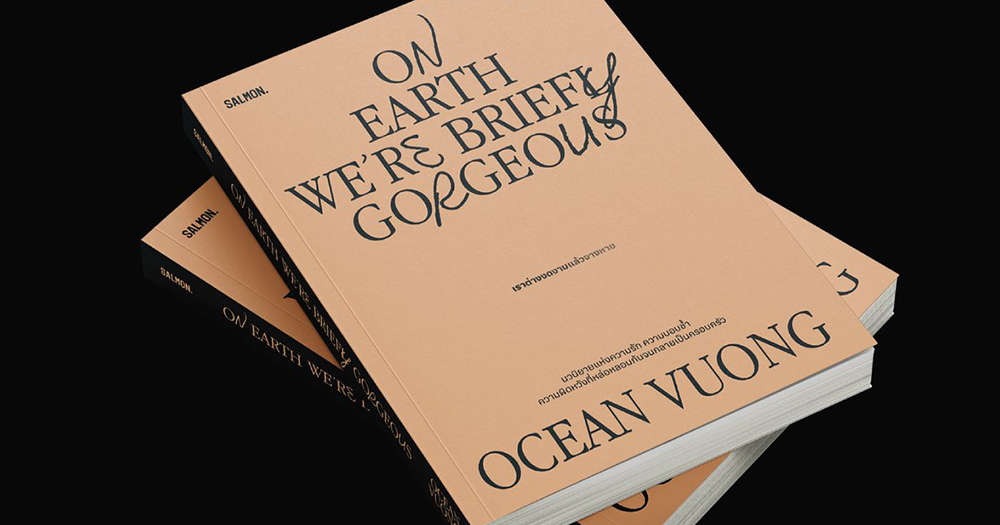One of my favourite sub-genres of queer literature is novels or memoirs written by poets. These books combine a poet’s masterful command of language with a narrative that extends beyond the bounds of poetry’s tight form. Ocean Vuong’s On Earth We’re Briefly Gorgeous is a great example. Written in the form of a letter from a son to his mother, it’s a queer novel about masculinity, class and trauma.
“Dear Ma,” it begins, “I am writing to reach you—even if each word I put down is one word further from where you are”. Vuong is a Vietnamese American, the child of a Vietnamese woman and an American soldier. He is a gifted writer, but his mother will never know it. She was forced out of school at the age of five when a napalm raid destroyed her Vietnamese schoolhouse, and she remains illiterate.
The book’s protagonist is called Little Dog, a nickname chosen by his grandmother, and he shares many biographical details with Vuong.
The character’s grandmother, Lan, escaped an arranged marriage as a teenage girl. She becomes a sex worker and is overcome by the dark tides of schizophrenia.
In one moment, we read about an American soldier aiming a weapon at her face while she holds her young daughter, Hong, who will one day become Little Dog’s mother. Decades later, Little Dog and his mother flee to America as refugees.
They settle in Connecticut, where Hong works in a nail salon and Little Dog on a tobacco farm. They are thousands of miles from Vietnam and yet, in their minds and bodies, the war continues.
One summer, Little Dog meets a young white man named Trevor. Their love story is beautifully true, complicated by trauma and addiction. Though it’s steeped in history, the queer novel feels vibrantly modern. Set against the backdrop of the opioid crisis, it paints a vivid portrait of what it’s like to build a life in a time of great upheaval.
Vuong’s prose is sublime, at once poetic and earthly. Consider this short vignette on loneliness: “You once told me that the human eye is god’s loneliest creation. How so much of the world passes through the pupil and still it holds nothing. The eye, alone in its socket, doesn’t even know there’s another one, just like it, an inch away, just as hungry, as empty.”
Some have criticised the book for being aimless, for failing to cohere into a legible narrative form. This is a valid critique, though I think part of Vuong’s achievement is creating a structure that captures the complexity and contradiction of life.
Written in a series of vignettes, it’s an easy book to dip in and out of, though don’t be surprised if you struggle to put it down. I swallowed it whole in a handful of days, gasping at his exquisite prose. The book mirrors the disjointed consciousness of a mind grappling with trauma. Little Dog’s story is haunted, both by the events of the past and the pain of the present.
That’s not to say that it’s a heavy read. At its core, this is a coming-of-age story. It’s an intimate queer novel about what it means to fall in love, despite it all.
Vuong writes about sex beautifully. He captures the passion of young love in effusive, visceral scenes and puts language to queer sex, unlike any literature I’ve read before. He writes with a poet’s precision, balancing vulnerability and strength, love with trauma, and passion with destruction.
This is a piece of queer literature about a complicated family where their love is undeniable, though it’s not always available. And it’s a rich and tender love story that lingers in the mind long after the final pages. I highly recommend it.
Clare Egan is a queer freelance writer based in Dublin. She writes a regular newsletter on writing, queer life, and everything in between.
© 2023 GCN (Gay Community News). All rights reserved.
Support GCN
GCN is a free, vital resource for Ireland’s LGBTQ+ community since 1988.
GCN is a trading name of National LGBT Federation CLG, a registered charity - Charity Number: 20034580.
GCN relies on the generous support of the community and allies to sustain the crucial work that we do. Producing GCN is costly, and, in an industry which has been hugely impacted by rising costs, we need your support to help sustain and grow this vital resource.
Supporting GCN for as little as €1.99 per month will help us continue our work as Ireland’s free, independent LGBTQ+ media.
